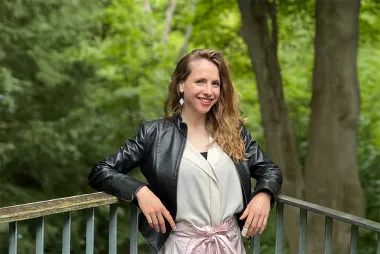"There is no secret; go to class, take notes, study hard, and don’t forget to enjoy it!"

Lauren Puumala
- Degree:
- Bachelor of Applied Science
- Grad year: 2021
- Program:
- Campus: Vancouver
In 2017 I moved to Vancouver from Thunder Bay, Ontario to begin my B.A.Sc. in Engineering at UBC. After completing first year, I knew that I wanted to pursue a multidisciplinary degree with a considerable design project component. As such, I decided to pursue Integrated Engineering (IGEN) with a focus in Mechanical and Electrical Engineering.
Exploring my interest in research was also a very important part of my undergrad. This interest was first sparked in high school when I worked on focused ultrasound research in a multidisciplinary lab at the Thunder Bay Regional Health Research Institute. Since then, I have spent three summers working as a Research Assistant at Lakehead University’s Biorefining Research Institute under the supervision of Dr. Pedram Fatehi, where I conducted lignin-related Chemical Engineering research. I am currently a Research Assistant in UBC’s Human Motion Biomechanics Laboratory, working under the supervision of Dr. Calvin Kuo on a project investigating ankle injury using MRI. Additionally, this past year, I completed a two-term research-based Mechanical Engineering course under the supervision of Dr. Lyndia Wu in which I worked on a project investigating mild traumatic brain injury using electroencephalography. These experiences furthered my interest in research, taught me valuable technical and communication skills, and have contributed to my decision to pursue graduate studies in the School of Biomedical Engineering at UBC starting this fall.
Aside from academics, I am an avid baker and enjoy spending time outdoors doing activities like hiking, running, and rock climbing!
Why did you choose to go into your field of study at UBC?
When I was exploring potential university programs in my final year of high school, UBC Vancouver caught my eye, not only due to its strong reputation and beautiful campus, but also because of its unique Integrated Engineering program. I really enjoyed all of my science and math courses in high school, so I was attracted to pursuing a multidisciplinary undergraduate engineering program, which is exactly what IGEN offered. I knew this would provide me with excellent opportunities to explore all of the traditional engineering disciplines while also giving me the flexibility to tailor my degree to match my specific interests in my third and fourth years. After learning more about IGEN during first year, I became even more attracted to it given that it is smaller than some of UBC’s other engineering programs; I liked that IGEN fostered a close-knit student community and would allow me to be in some smaller classes (a welcome change after being in several 350-person classes in first year). Moreover, I loved the idea of pursuing year-long design project courses in each year of the program. I knew this would provide me with valuable hands-on experience and opportunities to work on fun and innovative projects with great teams!
Looking back, I am so happy that I chose IGEN! In particular, throughout my undergrad, being able to explore many engineering disciplines allowed me to develop a strong sense of what I was most interested in. I ended up gravitating toward the Biomedical, Mechanical, and Electrical Engineering disciplines. During my last two years of the program, I was able to explore these interests in greater depth by taking courses focused on the biomedical applications of Mechanical and Electrical Engineering as technical electives. This also helped to guide my selection of a grad program.
What has made your time at UBC memorable?
When I think about my undergrad, the three full-year IGEN design project courses really stand out to me. During these courses, I gained practical experience designing, building, and presenting functional products from start to finish. Perhaps more importantly though, I was fortunate enough to work on these projects with some amazing groups of fellow IGEN students with whom I have become great friends.
This past year, my IGEN project group designed and built a modular railway inspection device that uses machine vision to identify, classify, and locate rail surface defects. If left unnoticed, such defects could lead to costly rail accidents such as derailments. During this project, I learned so much from my teammates, all of whom have unique interests and expertise in software, electrical, materials, and mechanical design. Our multidisciplinary group dynamic helped us to come up with innovative solutions to problems that arose throughout the design process and ultimately allowed us to produce a functional device that we were very proud of. During this year of online school, I also found it so valuable to have a group of classmates (and friends) to meet and work with every week, albeit over Zoom. Moreover, some of my favourite memories from this school year were undoubtedly made while conducting socially distanced group field trips to unused railways around Vancouver to conduct on-site device testing!
How are you applying the skills you learned through your studies at UBC?
This September I will be beginning a Master of Applied Science in the field of BioMEMS in UBC’s School of Biomedical Engineering under the supervision of Dr. Karen Cheung. Pursuing a M.A.Sc. will allow me to apply the technical knowledge and communication skills that I have developed throughout my IGEN degree in addition to the laboratory experience that I have gained over the past several years. I can’t wait to start working on my M.A.Sc. research project and continue learning about the field!
What advice would you give a student entering your degree program?
An undergraduate degree in any engineering discipline is bound to be challenging. When I began first year, I didn’t anticipate how much more demanding and technically challenging it would be compared to high school. Nearly failing one or two calculus quizzes at the beginning of first year really came as a shock, and I definitely let it affect my confidence. It took a while, but I eventually found my stride and started achieving grades that I was really proud of. I learned that it is so important to not let little hiccups like a bad quiz or exam grade get me down. I had to learn that one or two bad grades did not mean that I was doomed to do poorly in a course; assessing where I went wrong on that quiz or exam and adjusting my study strategies accordingly always allowed me to perform better in subsequent assessments. Further, this is a common experience shared by almost every engineering student I know. I think it is so important for incoming students to understand this and to know that persevering, maintaining a positive outlook, and staying motivated through these academic hurdles is key to success.
On a lighter note, try to find joy in your studies! Though there will be times when you are swamped with homework and don’t have much free time, that doesn’t mean you can’t enjoy those times too. Study with friends, enjoy small successes like completing a laborious calculation correctly or bigger successes like receiving an excellent grade on a tough exam, and know that sometimes, taking a little break is actually the best thing that you can do for your productivity!



